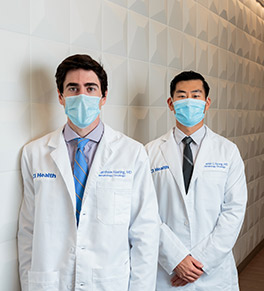You've been diagnosed with cancer, what next?

One in three Americans will be diagnosed with cancer in their lifetime. It’s something few people are prepared for.
UCI Health oncologists Dr. Matthew J. Keating and Dr. Daniel G. Kyung answer common questions patients ask:
When a person is diagnosed with cancer, what steps should they take next?
Dr. Matthew J. Keating: They should involve an oncologist as early as possible. But the patient also needs to take time to understand the diagnosis and potential repercussions of treatment before making treatment decisions. Rather than seeking answers online, patients should have open conversations with their oncologist and ask questions to understand their treatment options.
When should a patient diagnosed with cancer consult a cancer specialist?
Dr. Daniel G. Kyung: As soon as possible. It’s important to have an oncologist review the diagnosis, complete the appropriate staging work-up and start planning for treatment. The overall success of cancer treatment depends on the timely coordination of care, which may involve multiple specialists.
Is a second opinion important? If so, how does a patient choose a doctor?
Kyung: Yes. Second opinions are usually sought at academic cancer centers such as the UCI Health Chao Family Comprehensive Cancer Center, where specialists study and treat specific types of cancers. They can provide expert consultation for your particular illness.
Keating: A second opinion is also valuable if you are uncomfortable with or unsure of a treatment recommendation, and if you are interested in a clinical trial. Our cancer center has more than 300 active clinical trials — the largest number offered in Orange County. A second opinion can help ensure that the full range of treatments and published data are considered, and that the chosen treatment is the best fit for that patient.
A cancer diagnosis can be scary and stressful. What coping strategies do you recommend?
Keating: Find a doctor who is willing to address all your concerns, who makes time for you. Don’t be afraid to ask questions.
Kyung: Knowledge is empowering. At UCI Health, we work with you to make sure you understand your disease, the treatments being recommended and that you have access to support groups and other assistance.
For more information about UCI Health cancer services, please call 714-456-8000 or submit our online request form ›




